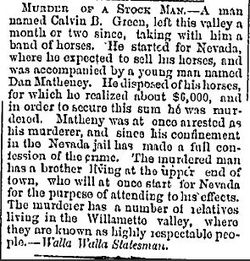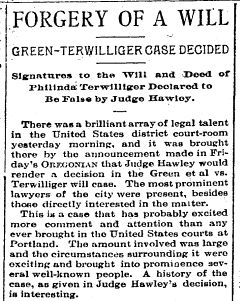While I was doing research on the Westlaw database, I found this case and was immediately interested because of its local history. And wills have a lot of genealogical value, even if they are forged! I present to you "Green v. Terwilliger", tried in the Oregon Circuit Court on August 29, 1892.
James Terwilliger was born in New York about 1808, and came to Oregon Territory in the early 1840's, where he established a business as blacksmith and tanner, and built a cabin in what is now downtown Portland. By 1845 he was a widower with two half-grown sons. Philinda Green was a widow with two sons, Calvin and William Green; they had traveled across the plains in a covered wagon in 1847.
In 1848 James and Philinda were married. Their daughter Julia was born in 1855, and shortly after that they purchased 640 acres of land near Portland, the east half of which was put in Philinda's name.

Philinda Terwilliger died in October 1873, just a couple of months after her son Calvin's death.
A Will Surfaces
On March 28, 1889, a will purporting to be written by Philinda Terwilliger was filed for probate in Portland, 15 years after its creation. The date of the will was August 14, 1873, and it had been kept in a desk in the Terwilliger home. The main bequests of the will were these:
- First, I devise, give and bequeath to my daughter, Julia Viola Terwilliger, of Multnomah County, Oregon, the house and furniture in which we now live, and also the undivided east half of the James Terwilliger Donation Land Claim that may not have been sold at the time of my decease.
- Second, I give and bequeath to my son, Wm. O. Green, of Washington Territory, my clock which I brought across the plains.
There were several questions addressed in court:
- The will was dated August 14, 1873, the exact same day that Calvin Green was murdered in Nevada
- The will does not mention Calvin Green at all
- Testimony was submitted to the effect that news of Calvin's death did not reach Portland until a week later, on August 21, 1873
- Although James Terwilliger had taught Philinda how to write her name, the will was written and signed "in an easy hand."
- Other documents that Philinda had signed during her lifetime were written on legal cap or blank paper
- This will was written on "small leaves torn from an account book, porous and dimly lined".
- The handwriting of the will, Philinda's signature, and the witness signatures was very similar

And there the matter would seem to have been decided, once and for all. Ah, but was it? There is much more to the story, which will be continued!
"Forgery of a Will", The Morning Oregonian, 30 August 1892, p.8; digital images; 19th Century Newspapers, (http://infotrac.galegroup.com.ezproxy.kcls.org
 RSS Feed
RSS Feed